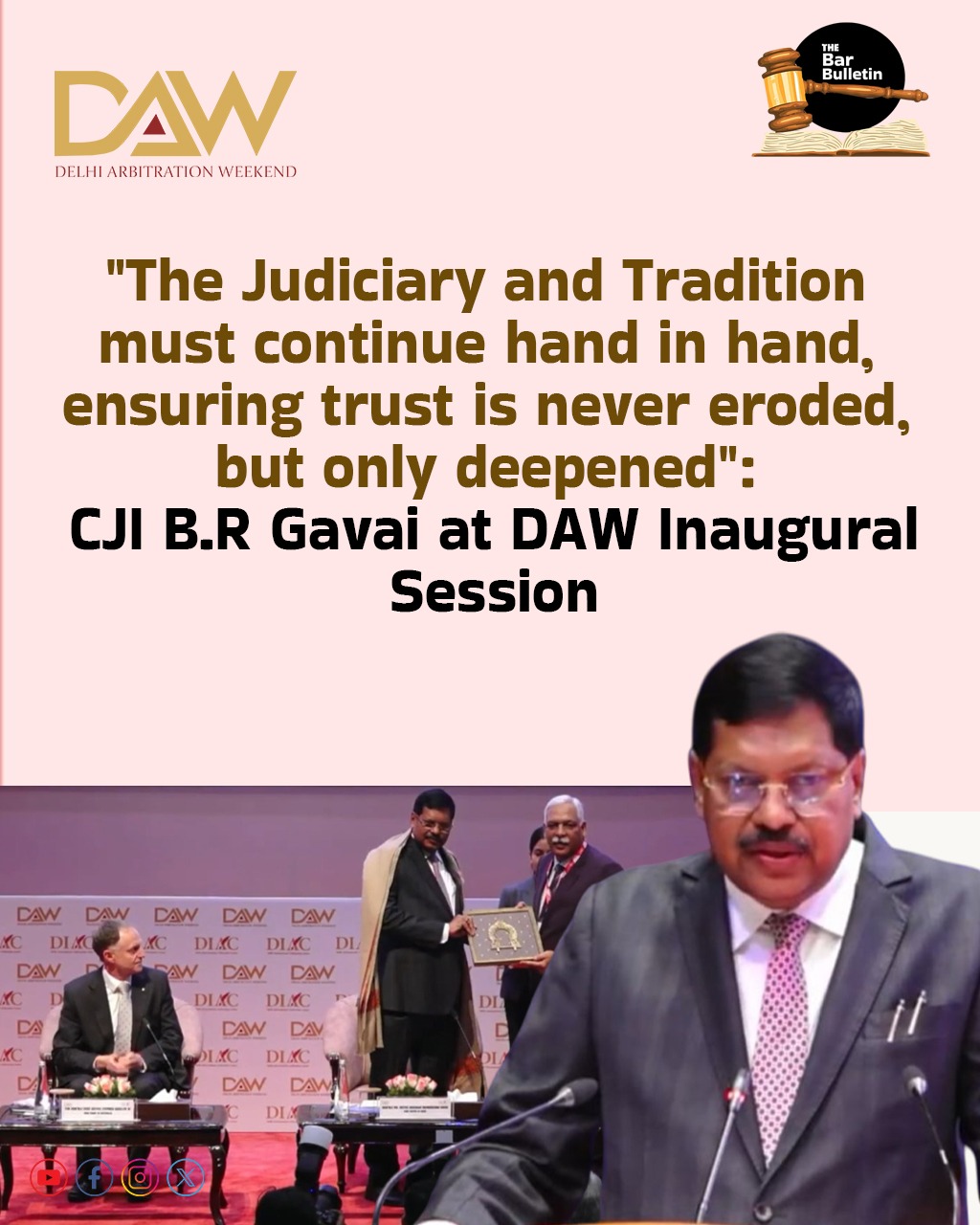The Delhi Arbitration Weekend (DAW), 2025 commenced with grandeur on 18 September 2025 at the Supreme Court of India’s auditorium, drawing an esteemed gathering of judges, senior advocates, arbitration experts, and international delegates. The event, organised by the Delhi High Court in collaboration with the Delhi International Arbitration Centre (DIAC), aims at building a network of experts, practitioners, and academia by engaging them in dialogues and panel discussions led by eminent legal luminaries from across the globe.
The session opened with a solemn tribute to Mr. Yashraj Samant, a key member of the working committee for organising the last two editions of the Delhi Arbitration Week, who passed away recently. Attendees observed a minute’s silence in his memory, honoring his significant contributions to the arbitration ecosystem in India.
Hon’ble Justice Devendra Kumar Upadhyaya, Chief Justice, High Court of Delhi delivered the welcome address, extending a warm greeting to the Chief Justice of India, Hon’ble Bhushan Ramkrishna Gavai, Hon’ble Chief Justice Stephen Gageler AC, High Court of Australia,judges from the Supreme Court and other high courts, senior advocates, and international delegates. Highlighting the significance of the event, he stated-“This weekend is not merely an academic or professional gathering; it is a collective reflection of India’s aspirations to emerge as a global hub for international arbitration.”
Chief Justice Upadhyaya emphasized the role of dialogue and knowledge exchange in shaping arbitration practices globally, noting-“Unless we expose ourselves to better ideas and practices, we may not be able to unshackle ourselves from local influences.” Chief Justice Upadhyaya lauded the contributions of both national and international participants in enhancing India’s arbitration ecosystem, underlining the need for collaboration between courts, institutions, and the arbitration bar to strengthen procedural efficiency and fairness.
Hon’ble Chief Justice Stephen Gageler AC, High Court of Australia delivered the keynote address.He explored “The UNCITRAL Model Law: A Model of Dialogue between the International and the Domestic” and Australia’s approach to building credibility in international arbitration. Chief Justice Gageler discussed how consistent judicial interpretation, institutional development, and procedural transparency have established Australia as a preferred seat for international arbitration.
Reflecting on India’s progress, he noted-“Australia has gradually built credibility through modern rules, efficient administration, and close engagement with government and professional bodies. India’s institutions, such as the Delhi International Arbitration Centre, are on a similar path.” Chief Justice Gageler emphasized judicial restraint as a cornerstone of arbitration credibility and how judicial clarity and the consistent interpretation of arbitration law provide confidence to both domestic and international parties. Arbitration, according to him, thrives when courts are regarded as guardians rather than intruders. He also highlighted the importance of fostering a collaborative international framework, underscoring that sharing experiences between jurisdictions strengthens arbitration globally.
Hon’ble Chief Justice of India B.R Gavai delivered a comprehensive plenary on “Judicial and Institutional Influence on the Evolution of International Arbitration in India.” Tracing the development from the post-World War II era, through the adoption of the New York Convention of 1958 and the UNCITRAL Model Law of 1985, he underscored the importance of integrating domestic legal systems with global arbitration norms. CJI B.R Gavai highlighted the indispensable role of courts and institutions in arbitration, remarking,“The concept of arbitration has survived the test of time because it balances autonomy with accountability, efficiency with thoroughness, and freedom with fairness. Without credible institutions and vigilant courts, arbitration risks either becoming captive to power or collapsing under duress.”
Focusing on India’s recent progress, CJI B.R Gavai acknowledged the Delhi International Arbitration Centre (DIAC), established in 2009, for its growing reputation as a forum capable of handling complex domestic and international disputes. He cited the Centre’s remarkable record in 2024, conducting over 15,000 hearings across 915 cases, stating, “India is not just ready for this challenge. The evidence is strong. The argument is compelling, and the verdict is clear—India is making significant strides in establishing itself as a prominent commercial and legal destination.”
CJI B.R Gavai elaborated on judicial interventions that reinforce arbitration credibility, including rulings upholding party autonomy, limiting judicial interference in awards, and recognising third-party funding in line with global best practices. On the integration of Artificial Intelligence (AI) in arbitration, he cautioned that while AI can enhance efficiency, it cannot replace human judgment, stating,“While AI can support non-judicial tasks, the adjudication of disputes requires human judgment, as the human conscience lies at the heart of delivering justice.”
On investment arbitration, CJI B.R Gavai stressed the delicate balance between investor rights, state sovereignty, and environmental protection, noting,“Environmental considerations are central to investment arbitration. The future of arbitration lies in harmonizing economic growth with environmental protection, safeguarding investor rights, state sovereignty, and global sustainability.” CJI B.R Gavai also emphasized accessibility and procedural transparency, urging arbitration frameworks to remain efficient, impartial, and inclusive, particularly for micro, small, and medium enterprises. He concluded by reiterating the global significance of India’s evolving arbitration landscape: “The Judiciary and tradition must continue to work hand in hand, ensuring that trust is never eroded, but only deepened.”
Lastly, Chief Justice Upadhyaya reflected on the broader vision of the event, drawing on the Sanskrit phrase Vasudhaiva Kutumbakam, meaning “the world is one family.” He noted, “For those with a big heart, the whole earth is their family.”
To conclude the inaugural session on a celebratory note, the evening featured a musical performance, blending classical and contemporary melodies that showcased Indian artistry and provided a moment of reflection and cultural engagement for the participants.



